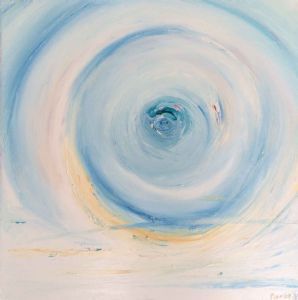

La Vie
Oil on Canvas,
US$
188
SOLD

|
La Vie
Sorry but this work has already been sold. may be willing to undertake a commission.
Remove from your favorite works list
Add to your favorite works list
Send as an eCard!
Details
Oil on Canvas
Quality oils
W: 600mm x H: 600mm
W: 24" x H: 24"
Approx. Weight: 1.2kg
This work is
unframed
Price
US$ 188
SOLD
Scale
Reference
MoBo672
About "La Vie"
The ocean, life, love, peace, happiness
|
Remove Maurice from your favorite artists list
Add Maurice to your favorite artists list
View all 34 works by Maurice Boshoff
About Maurice
In life art has many forms and media. Play of light on colour & figure inspires and essence of light on hue motivates this painter. A keen interest in sculptural and city scape architectural form and how light plays off if it are included in this. "Non scholae sed vitae discimus". The wondrous ways in which light in its many permutations unveils the nuances in natural and man made objects is infinite in its ability to inspire and amaze us. Striving to explore the essence of art in culture and life in all its forms both rigid and fluid.
Whereas Expressionism and Abstract art are perhaps not always the most popular initial styles currently, for those interested to take a moment its relevance to current trends is set out in a short (by no means conclusive) background of the greater style movement, origin and development.
Proto Expressionism originally referred to the early expressionists. Expressionism (as the original founding movement in Central Europe at the (very) beginning of the 20th century, is linked to various media and there it includes sculpture, literature, music, architecture, movement and dance, amongst others. This then evolved to Expressionism which from the 1940's led to the rise of Abstract Expressionism (various scholars hold differing views). Proto Abstract Expressionism is perhaps strongest in the works of people like Mark Rothko, Arshile Gorky and Jackson Pollock who in turn gave rise to Abstract Expressionism. After the horrors of the second world war the formal philosophies of European abstractionists merged with the emotional outpourings of amongst others the Expressionists who'd been silenced and ostracised by oppressive regimes to create a new kind of art- an unrestrained untraditional type of art - Abstract Expressionism. As a broad term a means for historians, critics and collectors to categorise the work of a vast number of diverse contemporary artists. "Pictures" of expressionism are dynamic; expressionist painters express their subjective emotions via painting (or their specific chosen field whatever that may be), the emphasis being placed on communication through emotion. Abstract Expressionism became perhaps the most important artistic movement of the post war years in influence where Expressionism likely arose as a reaction to Naturalism, as is the nature of art to continuously evolve. Its goals were to show the world or chosen subject by proclaiming humanity's aspirations, hopes, dreams and fears.
From there Abstract Expressionism led to various other currents like New Expressionism, Digital Expressionism (Pointism, derived from the print media in the 1990's), New Proto Expressionism (best encapsulated by the architecture of Edgar Wood), etc.
Where abstract art movements of the early 20th century could be a little cold or theoretical - the analytical Cubism of Picasso or Braque, the Supremasism of Malevich, Italian Futurism and the Rayonism of Goncharova et al. However at the heart of all abstract movements lay a desire to capture or represent at least some form of inner insight of the artist through an unconventional depiction of the outside world. Whatever medium that may take. Refer to the vigorous brush strokes of Van Gogh, the simplified forms of Cezanne, the strong and vibrant colours of Gaugin or Matisse, all of whom likely focused on bringing thoughts out onto canvas. Some
Expressionists rejected the aesthetic goals of the Impressionists, preferring the energetic styles of Van Gogh, Matisse et al as a way to achieve overt expression. It was about the externalizing of their inner emotion and not the capture of the impression perceived that mattered in that school of thought. Among these Expressionists was a group of young Russian emigres who banded together with a group of predominantly European artists known as " Blaue Reiter", the common goal of which was to find ways to express their ideas through painting. The group was founded by Wasilly Kandinsky and Franz Marc - both known for their symbolic use of colour and abstract imagery. Kandinsky in particular was known for what he called 'spontaneous painting' in which he was guided by 'intuition' more than 'intellect'. He called his spontaneous painting style 'improvisations' as opposed to the usual calculated rendering. He (Kandinsky) called his devotion to seeking the beauty "fervour of spirit" and spiritual desire and or inner necessity. From there expressionism continued to branch out in various styles over the next few decades. Abstract Expressionism continues in influence today.
Price Range
US$ 71-818
Email
Education
BA (Arch & Art hist), assorted other international diplomas
People who chose Maurice's work also chose work by:
Find other:
|

 In the USA you can call us FREE on
In the USA you can call us FREE on






